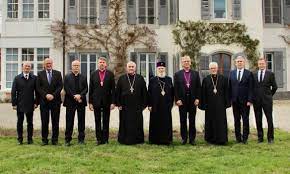The World Council of Churches (WCC) convened an Ecumenical Roundtable Consultations on the situation in Ukraine today at the Bossey Ecumenical Institute in Switzerland to consult, share perspectives on the conflict and its causes, and to discern possible paths forward for the churches together in working for peace in the midst of war.
The meeting had in attendance senior representatives of WCC member churches from several European countries neighboring and directly affected by the current conflict.
In his opening remarks, the convener of the gathering who is also the WCC Acting General Secretary, Rev. Prof. Ioan Sauca decried the inability of some members to join the meeting saying it was part of the negative effect of the war that has prevented the most affected members from joining the discussion however said there were several other such meetings lined up to hold in the future.
“We regret that it was not possible for the representatives from Russia and Ukraine to travel to join us for this consultation, though they had accepted the invitation to do so. “This is one of several roundtables that will be convened.” He said.
“We denounce the military aggression launched by the leadership of the Russian Federation against the people of the sovereign nation of Ukraine, We affirm the right of the people of Ukraine to defend themselves against this aggression, we expresses grief for all the precious lives already lost”.
“We lift up the compassionate care and support offered to the Ukrainian refugees by the authorities, local communities, churches and church-related organizations in neighboring countries, as a good example of the care and support all refugees fleeing from every such threat to life and dignity should receive” he said.
The group joined in the call for a cease-fire in Ukraine, for humanitarian corridors to be opened and respected, and for sustained negotiations for a secure and just peace, to bring an end to this suffering.
“We also call for recognition, respect and protection of the God-given human dignity of every human being in harm’s way due to this or any other armed conflict”.
Prof. Loan said that all those responsible for violations of applicable laws and crimes against humanity must be held fully accountable for their actions, adding that beyond the borders of Ukraine, and the new Diaspora of its displaced and suffering people, there are also concerns about the even wider, longer-term consequences of this unjustifiable aggression stressing that the wider consequences across the globe as the conflict continues, includes food shortages.
“We share the strong conviction that there is no legitimate way in which this armed aggression and its terrible consequences can be justified or tolerated from the perspective of our most fundamental Christian faith principles”
“Acutely conscious of the grave risks of further escalation of the violence in Ukraine, of wider and even more destructive conflict, and of the abhorrent threat of weapons of mass destruction, we appeal for diplomacy instead of threats, dialogue instead of confrontation and exclusion, truth instead of disinformation, and for the voice of conscience – inspired by God’s will for all the people of God and God’s unique creation – to be heard.”
“As leaders of Christian communities facing this conflict and its consequences, and aware that sister churches hold different perspectives on the conflict’s root causes, we stress the importance of the WCC as the ecumenical movement’s leading instrument for sharing divergent perspectives, struggling with our differences, and seeking reconciliation and unity in word and deed to which our faith calls us. We join in fervent prayer for peace in Ukraine, in Europe and in the whole world, for the transformation of hearts and minds presently fixated on confrontation and violence, and for a turning to the path of peace where our Lord and Saviour Jesus Christ lead us.” He appealed.
Rev. Prof. Ioan Sauca also affirms the role of the World Council of Churches as a platform for ecumenical dialogue.
“We acknowledge the calling of churches and of the ecumenical movement to be peace-makers, and mutually commit to continuing to meet and to work together for justice and peace, counting on the good offices of the WCC to continue to convene us and enable our intent”
“We renew the invitation to the WCC member churches in Russia and Ukraine to join us in another roundtable discussion as soon as possible.” He concluded.
As the War in Ukraine rages on, Ziti News will continue to monitor the WCC Ecumenical developments on issues relating to the war, its resolution and efforts in order to share with you updates from one of the world’s leading voices for action to bring the war to an end.
